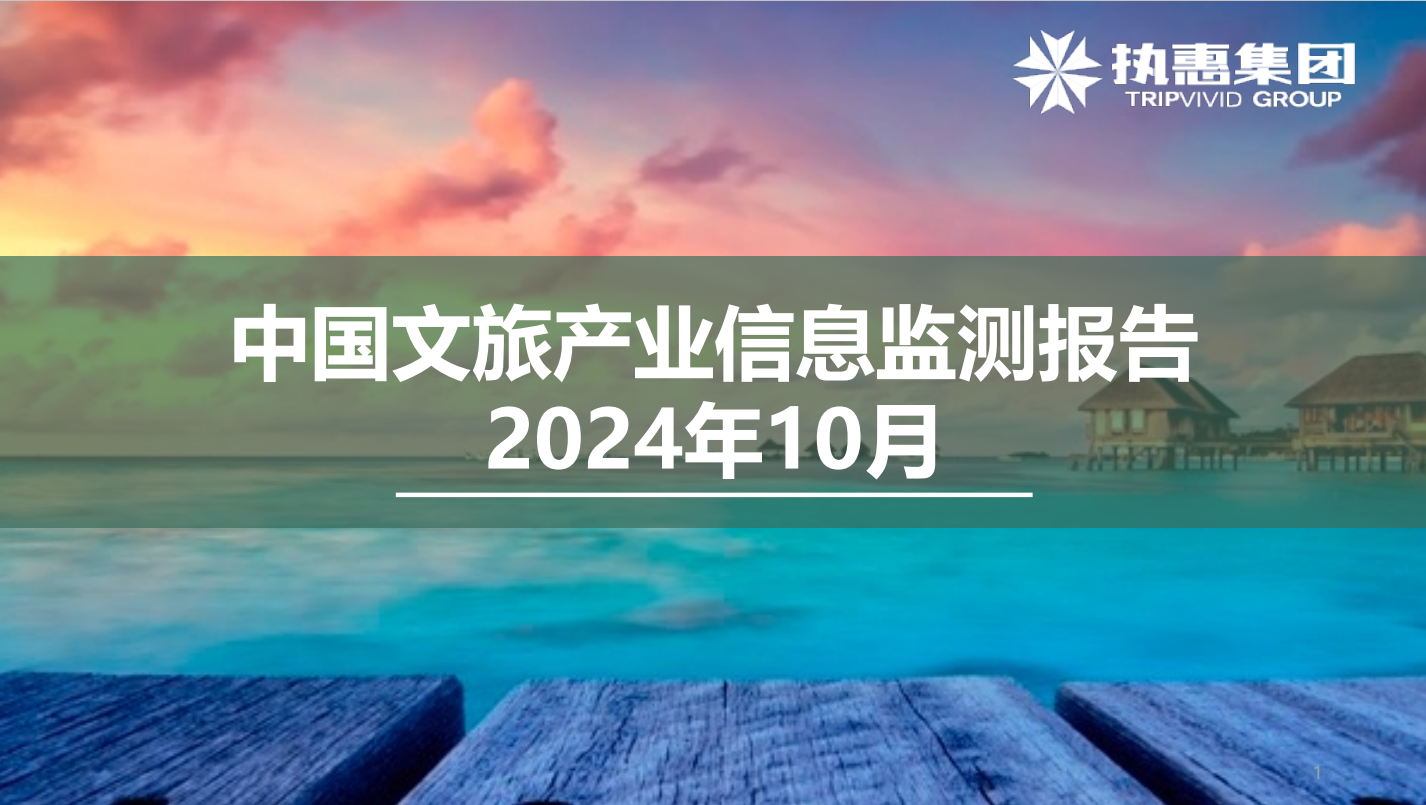新用户登录后自动创建账号
登录第六届欧洲乡村旅游峰会在立陶宛召开,执惠创始人兼CEO刘照慧受邀出席并发表演讲

10月3号到5号,由UNWTO、欧盟、欧洲旅游协会主办,欧洲乡村旅游承办的第六届欧洲乡村旅游峰会在立陶宛召开,执惠创始人兼CEO刘照慧受邀出席并发表演讲《中欧乡村旅游交流须考虑三大因素》。
刘照慧认为,中国旅游经过近40年跃迁式发展,有三大变化因素值得欧洲思考。欧洲乡村旅游对中国乡村旅游的发展有借鉴意义,中欧应该在从发展模式到文化互动层面寻找中欧旅游交流更好的角度,不仅仅是中欧两大旅游目的地互送游客那么简单,需要更开放、更创新、更深度、更广泛的交流,不管官方还是产业。他希望中欧能在更高层面上互享两大文明体的优秀成果和体验彼此的美好生活方式。
以下为刘照慧演讲全文:
女士们、先生们,很荣幸受邀参加2018欧洲乡村旅游大会,我是来自中国文旅媒体执惠的创始人兼CEO刘照慧,大家可以叫我Leo。我演讲的题目是《中欧乡村旅游交流要考虑的三大因素》。旅游业的重要性已经不言而喻,文化展示、环境保护、和平与安全、就业、经济增长、发展。全世界旅游业的发展解决了1/10的就业、世界出口额的7%,服务业出口额的30%,高达1.6万亿美元的出口额,贡献了全世界10%的GDP。
Ladies and Gentlemen,
Good morning! It is a great honor to be invited to attend the 2018 European Rural Tourism Congress. I am Liu Zhaohui, founder and CEO of China Travel Media. You may call me Leo. The topic of my speech is Three Changes Should be Taken into Consideration for the Sino-EU Rural Tourism Communication. The importance of tourism has become self-evident, cultural exhibition, environmental protection, peace and security, jobs, economic growth, development. The development of the world's tourism industry has solved 1/10 of the employment, 7% of the world's exports, 30% of the service sector's exports, as high as $1.6 trillion in exports, contributing 10% of the world's GDP.
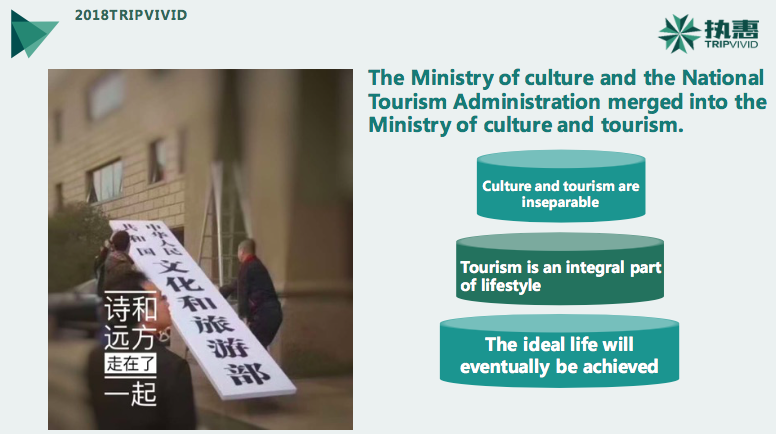
对中国来说,今年的旅游业的一件大事就是文化部与国家旅游局的合并,成为文化和旅游部。我们坚信文化与旅游的不可分割,旅游与生活方式的水乳交融,诗和远方终成眷属。旅游是文化的载体,文化是旅游的内容和品质,生活方式不过是我们在庸常生活中以旅游的方式感受文化,度过更丰盛,更有意义人生的一种途径。
For China, one of the major events in the tourism industry this year is the merger of the Ministry of Culture and the National Tourism Administration as the Ministry of Culture and Tourism. We strongly believe that culture and tourism are inseparable, tourism is an integral part of lifestyle, and that an ideal life with both poem and travelling will eventually be achieved. Tourism is a carrier of culture, whereas culture provides content for and enhances the quality of tourism. Lifestyle is simply an effective means to experience culture in our everyday life via tourism so as to help us lead a more colorful and meaningful life.
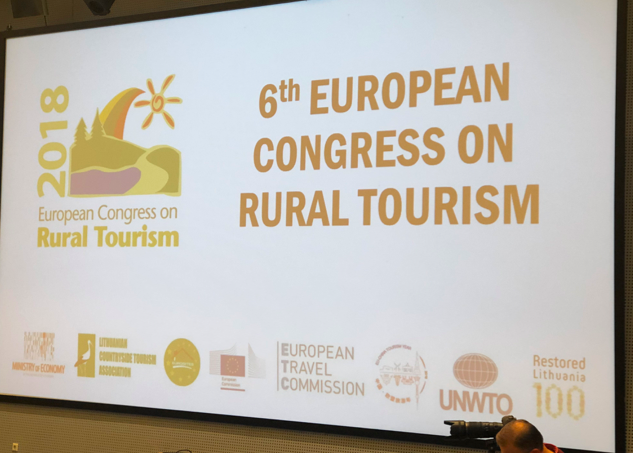
因素一:改革开放四十年,中国旅游也正经历跃迁式发展
FACTOR #1
Chinese Tourism Has Been Escalating Since the Reform and Opening up for Forty Years
今年是改革开放四十周年,中国取得的伟大经济成就举世瞩目。中国国民生产总值从1978年的3645亿迅速攀升到2017年的82.7万亿, 增长了226倍。中国GDP占世界经济比重从1978年不足2%,增长到2017年的15%左右,稳居世界第二。可以说,当今的中国是一个名符其实的全球性经济大国,中国也迎来了伟大复兴的最好历史时期。
This year marks the 40th anniversary of China’s reform and opening up policy. Tremendous achievements have been made over the past 40 years. National Gross Product has soared from 364.6 billion RMB to 82.7 trillion RMB, an increase of 226 times; and its share in the global economy has grown to roughly 15 percent, up from less than 2% in 1978, steadily holding the second place in the world. Currently, China is, in every sense, an influential global economy, and has entered the best period during which the goal of national rejuvenation will be achieved.
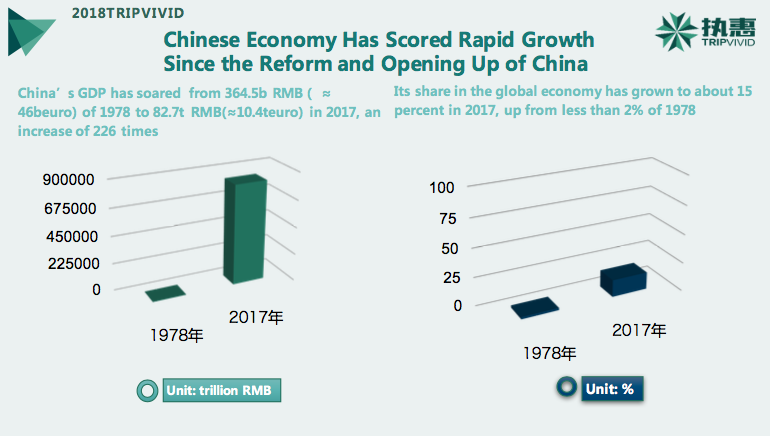
中国人民享受到了改革开放的红利,开始走向更富裕、更多元化消费的生活,人民对生活的追求从“有没有”变成了“好不好”,高品质生活开始成为新的追求目标,对美好生活的向往成为社会共识。
Chinese people have benefited a great deal from reform and opening up and began leading a better life with more diversified spending options. Since their criteria of living a better life has shifted from quantity to quality, pursuing high quality life has become their new goal. In general, aspiring to a better life has become a consensus in the society.
中国旅游业也在这四十年中飞速发展。早在1978年,邓小平就发出了“旅游事业大有文章可做,要突出地搞,加快地搞”的号召。1979年,邓小平以75岁高龄徒步登上黄山之巅,亲手拉开中国旅游业发展的历史大幕。从新中国成立到1978年,旅游业作为中国外交事业的延伸和补充,更多承担的是民间外交接待的功能,其实并不具备现代产业的特征。1949年到1977年,全国入境游客接待量总计不到70万人次。而同一时期,世界旅游业经历了加速发展的黄金30年,全球国际旅游收入增长了近33倍。就现代旅游业的起点而言,中国比西方国家晚了整整近百年。
Meanwhile, China’s tourism industry has also experienced rapid growth during this period. As early as 1978, Deng Xiaoping proposed that “Since the tourism affairs have great potential, we should place it on a higher priority and speed up its development”. In 1979, he climbed to the top of Huangshan Mountain at the age of 75, which was seen as a milestone event in the development of China’s tourism industry. From the founding of People’s Republic of China to 1978, the tourism industry in China served only as extension and supplement of China’s diplomatic affairs and mainly functioned as role of people’s diplomacy, without any trace of industry features by modern standards. From 1949 to 1977, the total number of inbound visitors was less than 700000. By comparison, the global tourism industry has been growing rapidly for 30 years, and the international tourism income increased by nearly 33 times during this period. As far as starting point of the modern tourism industry is concerned, China has lagged behind western countries for nearly a century.
自改革开放后旅游业才迅速成为中国经济的一大支柱。1999年黄金周正式启动, 中国旅游业近二十年生机盎然。国民人均旅游频次从1989的0.2次增长到2017年的3.7次。国内游从1984年均2亿人次扩大到2017年50亿人次, 而2017年旅游总收入达到5.4万亿,旅游投资高达1.5万亿。当然,我们也不能忘记虽然2017年中国旅游总人次已经排名世界第一,中国出境花费继续领跑世界,但收入却仅为美国的2/3。
Only after reform and opening up policy was implemented did the tourism industry has become one of pillar industries for China’s economy. Since the official launch of Golden Week Festival in 1999, the tourism industry in China has been prosperous for almost 20 years. The average number of tourist visits has risen from 0.2 in 1989 to 3.7 of 2017. The total number of domestic visitors has expanded from 200 million in 1984 to 5 billion of 2017. In 2017, the total tourism income reached 5.4 trillion RMB and tourism investments stood at 1.5 trillion RMB. While the total number of Chinese domestic and outbound visitors has secured the first position in the world, and China continues to lead global outbound travel in terms of expenditure. we should bear in mind that its total tourism income is only two thirds of that in America.
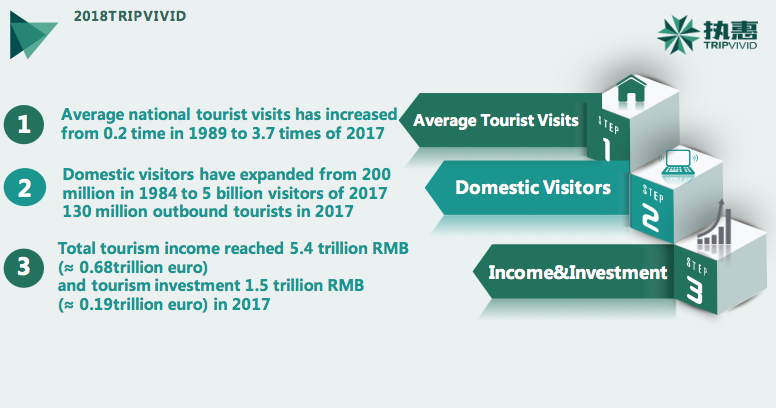
其实,中国改革开放取得的成绩不过是全球经济近250年来跃迁式发展的一个突出样本。根据加州大学伯克利分校经济学家(J.Bradford Delong)的研究,在人类历史上,从旧石器时代到公元2000年的250万年间,人类花了99.4%的时间,完成了3%财富的积累。人类97%的财富,是在过去250年,也就是0.01%的时间里创造的。
In fact, China's achievements in reform and opening up are only a prominent sample over the course of the rapid development of global economy in the past 250 years. According to a study by J. Bradford Delong, an economist at University of California, Berkeley, in human history of the 2.5 million years from the Old Stone Age to 2000, it takes 99.4 % of the time to accumulate 3 % of the total wealth, while the rest of the wealth built by human being has been created in the past 250 years, which only accounts for 0.01 % of the total time.
这个跃迁有着深层的原因,250年前,以亚当·斯密的《国富论》为代表,市场经济机制形成,劳动生产力获得极大的提高; 三次工业革命推动了新能源新技术的使用,交通便利化,全球贸易频率加速;而在互联网技术推动的信息革命及数字化浪潮下,全球贸易更加广泛和深入。250年前,人类能够消费的商品种类仅有数百种,而现在达到上亿种。
There are underlying causes for the changes. 250 years ago, as the market-oriented economy mechanism driven by classic works like Adam Smith’s Wealth of Nations, came into being, the productive forces have improved significantly. Thanks to three industrial revolutions, new energies and technologies have been widely used, transportation has been facilitated, thus accelerating the process of global transactions. With the wide spread of Internet–based information revolution and digitalization, global trades has grown wider and deeper. 250 years ago, only several hundreds of commodities are available for human being, while the number of commodity categories today has reached hundred million.
在大规模战争得到有效抑制,贸易全球化、城镇化、人口规模因素、互联网、人工智能、区块链、物联网等新技术等众多因素的快速推动下,全球经济达到了有史以来最好的发展时期。随之而来的则是从消费升级到消费跃迁的自然呈现。
A number of other factors also contributed a lot. For example, large-scale wars have been effectively contained. Thanks to the wide spread of trade globalization and urbanization, and the adoption of technologies like Internet, artificial intelligence, block chain, Internet of Things, the global economy has entered a period with the best growth opportunities. A natural outcome of consumers’ spending power to a new level followed.
因素二:中国新消费群体的代际更迭
FACTOR #2
The Demographic shifts of the consumption preferences of young Chinese tourist
消费升级已经成为了一个热门词汇和一种商业趋势,从国家层面看,消费升级在切实地发生。从消费总量上看,居民消费支出占国民经济的比重有了明显提高;从消费结构上看,中国居民衣食类消费比重持续减少,服务类消费比重在不断提升。
Consumption upgrade has become a buzz word as well as a business trend. From national perspective, consumption upgrade is actually happening across the country. As far as total consumer spending is concerned, the proportion of consumer spending to gross national product has increased remarkably. With regards to consumption structure, the proportion of people’s spending on clothes and food has further declined, while the proportion of service-based spending has continuously increased.
根据《中国统计年鉴》中的划分方式和统计数据,占全国人口20%的高收入群体2016年人均可支配收入达到59259元。20%是什么概念?就是中国国拥有一个人口堪比美国的强购买力群体,那么国内消费升级如火如荼就很容易解释了,因为他们才是飞机高铁头等舱爆满、奢饰品拥趸、五星级酒店常客、出国买遍全球主力军。
According to the grouping method and statistics of China Statistical Yearbook, the average per capita disposable income of high income demographic, which accounts for 20% of the national population, reached 59259 RMB in 2016. What does 20% mean? It means that China has a large demographic whose purchasing power as strong as that of Americans. This is the reason why the trend of spending more becomes so obvious in China, for these people are not only frequent customers of first class cabins at airplanes and high-speed trains, luxury stores, or five-star hotels, but also go on a shopping spree across every corner of the world.
事实上中国改革开放四十年积累的社会财富和消费需求的洪流呈现出堰塞湖式效应,上一代集聚的财富在下一代更年轻群体身上急剧释放,国人在短短四十年的时间里要完全对等,甚至超过欧美经过上百年积累至今的生活方式和生活水准。中国的奢饰品消费者平均比欧美年轻十岁以上,我们要用一样的包,开更好的车,更具移动化、体验化、个性化的度假方式。这就给文旅供给侧改革带来极大的挑战,中国消费者的消费习惯不是慢慢养成,而是结构性的改变,中国消费者中的富裕阶层几乎在一夜间抛弃了以往的生活方式,全面进入甚至超过欧美发达国家消费水平。
The social wealth and consumption demand accumulated over the past 40 years after reform and opening up has shown the barrier lake effect, which means the wealth amassed by the previous generation needs to be consumed in a faster pace by the younger generation. That is to say, Chinese people need, in a short period of 40 years, to catch up with, even surpass westerners who have built their lifestyle and living standards for about one hundred years. Although the Chinese luxury consumers are generally at least 10 years younger than their European and American counterparts, they use the same brand bags, drive better cars, and go on a vacation that focuses more on mobile bookings, good experience and personalization. This presents a great challenge to the supply-side reform of cultural tourism. Instead of cultivating consumer habit in a gradual way, Chinese consumers are experiencing structural changes. As a result, the more affluent consumers seem to have made a break with their past lifestyle in a very short period time and entered a stage in which their purchasing power is as strong as, even stronger than their counterparts in European and American countries.
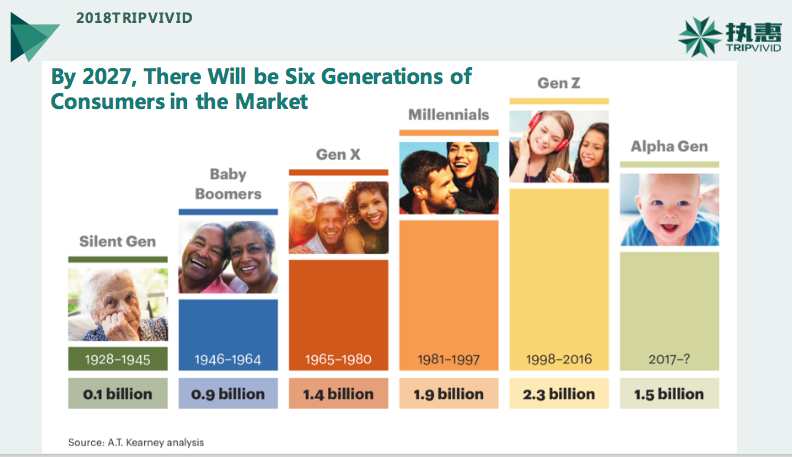
研究显示,中国互联网原住民一代拥有相通的价值观,通过网络平台表达和传播。千禧一代还拥有网络时代之前的记忆,但是互联网原住民一代却是实实在在的数字原生代,年龄最大的也仅仅和谷歌同岁。
和追求“酷”的千禧一代相比,互联网原住民一代的座右铭是“独特即是新酷”。另外,互联网原住民一代消费者将产品视作“酷”的表现工具——表达他们的个性和独特性。
Our study found a unique set of shared Gen Z values, expressed and amplified by those digital technology platforms. Although Millennials still remember a world prior to personal technology and digital platforms, Gen Z are true digital natives, with the oldest born in the same year Google was established. Gen Z are more private than Millennial in sharing content, preferring small, closed communities or direct messaging, such as Snapchat, whereas Millennials share more broadly on social media. Likewise, Gen Z are members of the first post-race, post-gender generation, living in an age of marriage equality and gender-neutral bathrooms. This tolerance means that compared to Millennials, who followed major trends of “cool,” the Gen Z motto is “Unique is the new cool.” Furthermore, Gen Z consumers use products as tools to express that cool—to express their individuality and unique sense of identity.
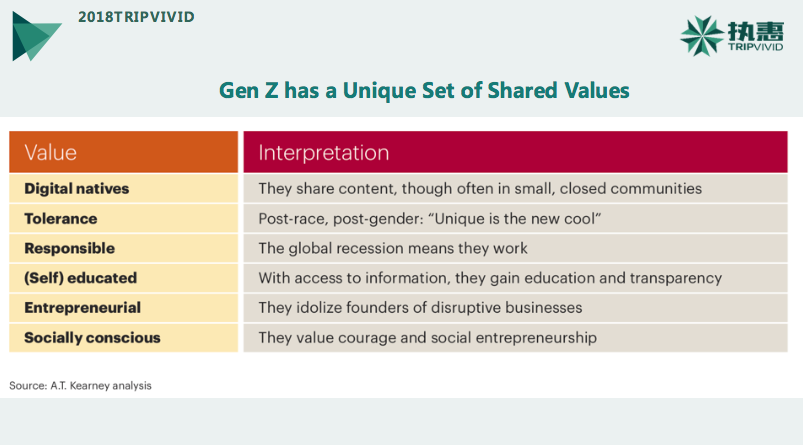
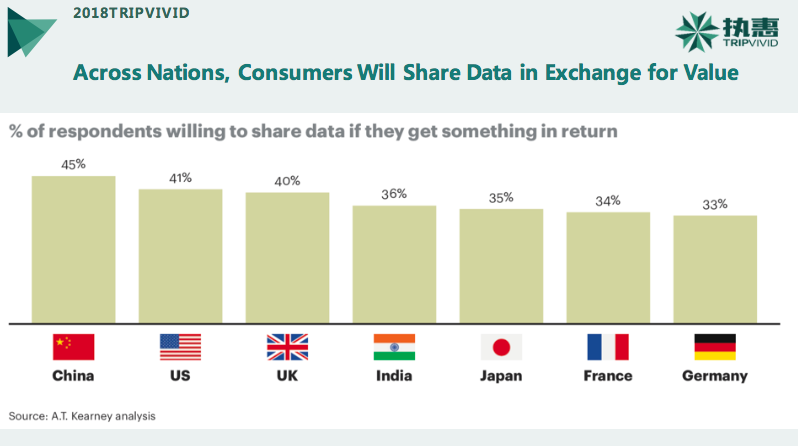
因素三:促进中欧乡村旅游交流需要创新的模式
FACTOR #3
European Rural Tourism Needs More Innovative Development Mode to Promote Sino-EU Communication
首先要理解中国乡村旅游承担的新使命,其中之一就是中国乡村旅游已经能成为中国现代服务业产业升级的主力军之一
A Powerhouse for Upgrading China’s Modern Service Industry
当我们在谈消费升级、消费跃迁时,我们也应该一起思考下中国文旅大消费产业的新使命。在中国经济的下一个20年里,增量部分相当大的比重会在服务业,其在中国经济构成里会超过60%、70%,目前刚过50%。文旅大消费产业的融合与升级将决定中国未来服务业的体量和质地。我们今天再谈论的文旅已经发生了极大的变化,旅游与教育、体育、文娱、地产、康养、农业等产业的跨界融合将是大势所趋,新思想、新实践、新模式、新范式将层出不穷,产业的整合与重组也将更频繁的发生。因此整个产业将出现更多的跨界融合。乡村旅游是中国文旅大消费产业的重要组成部分,文旅大消费产业占中国GDP总量的10%以上,也势必担当起中国现代服务业升级的重任。
When we talk about the changes of consumer spending power, we should also think about the new missions of cultural tourism mega consumption industry in China. In the next 20 years of China’s economic growth, a quite large proportion of the addressable market will be from the service industry, which will account for 60-70% of China’s economy, as opposed to the current 50%. In a way, the scale and quality of the service industry in China largely depends on how Integration and upgrade of the cultural tourism mega consumption industry evolve. In fact, the cultural tourism we are talking about now has undergone great changes. Integrating tourism with such areas as education, sports, culture and entertainment, real estate, healthcare, agriculture will become a trend, new thoughts, new practices, new models, new forms of business will spring up, and integration and consolidation deals will happen more frequently in this industry. Therefore, there will be more integration among different industries. It is estimated that the cultural tourism megaconsumption industry makes up more than 10% of GDP in China, it will serve as a powerhouse in the process of upgrading China’s modern service industry.
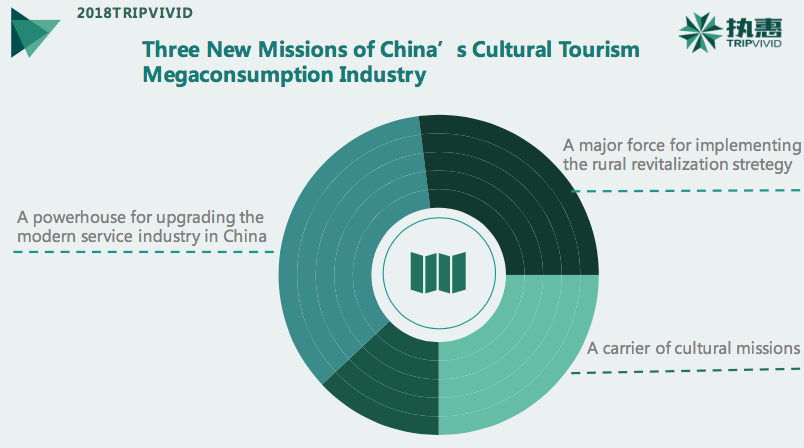
其次中国乡村旅游是中国乡村振兴的抓手
A Major Force for the Rural Revitalization Strategy
1978年,中国农村人口占总人口80%,是典型农业国家。当时农村居民家庭的人均生活消费支出为仅为116块,不足20刀,恩格尔系数高达67.7%,到2017年时,这一数字分别变为10955元和31.2%,增长了94倍,7亿人口脱贫。2017年中国人均GDP达到8836美元,即将达到中等收入国家陷阱的门槛。
In 1978, with the rural population responsible for 80% of the total population, China is a typical agricultural nation. At that time, the average daily spend of rural residential families was merely 116 RMB, shy of 20 dollars, with Engel coefficient as high as 67.7%. In 2017, per capita spend increased by 94 times to 10955 RMB, Engel coefficient dropped to 31.2%, and a total of 700 million people were lifted out of poverty. As of 2017, China’s per capita GDP topped 8836 US dollars, almost reaching the threshold set for so-called middle income trap countries.
改革开放是从安徽凤阳的小岗村开始,市场经济的实践给中国农村注入了活力,40年后我们回到乡村,回到民宿集群,田园综合体,特色小镇。寄望于乡村振兴作为国家经济结构调整,城乡结构二元化问题解决的抓手。文旅大消费产业都势将在乡村振兴的大战略中扮演更重要的角色。“中国高度重视生态环境保护,秉持绿水青山就是金山银山的理念,倡导人与自然和谐共生,坚持走绿色发展和可持续发展之路。”
The reform and opening up policy was first experimented at Xiaogang Village, Fengyang county of Anhui Province. Since then, putting market economy into practice served as a shot in the arm for the economic development of the rural areas in China. 40 years later, we shift our focus back on the rural areas, on alternative home clusterings, pastoral complex and featured towns. The Chinese central government holds high hopes for the rural revitalization strategy, seeing it an important solution to national economic restructuring and urban-rural structural problem. There is no doubt that the cultural tourism megaconsumption industry will play a key role in implementing the rural revitalization strategy, especially in poverty alleviation through tourism.
“China highly values ecological and environmental protection. Guided by the conviction that lucid waters and lush mountains are invaluable assets(by President XI Jinping), the country advocates harmonious coexistence between humans and nature, and sticks to the path of green and sustainable development.”
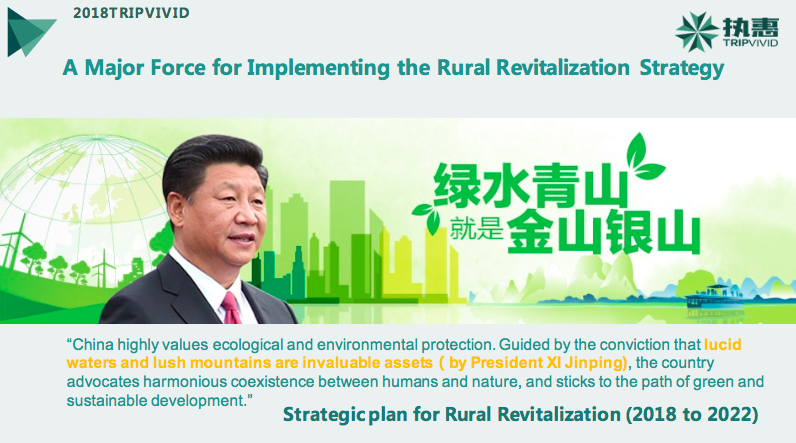
当我们都在思考文旅大消费产业的市场、模式、商品时,我们也应该更深层的思考它所承载的文化使命。文旅中的一物一景,一砖一瓦,一个仪式,一个风俗,无不渗透着文化的元素,我们对目的地的探访,人与人的交流,无不体现着文化交流的美好。文旅是构建人类命运共同体最为柔性,最容易被接受,也最美好的方式。文旅大消费做到可感、可触、可消费既是产业诉求也是发展之道。
When we think about the potential market, models and merchandises brought by the cultural tourism mega consumption industry, we should also think further over the cultural missions carried with this industry. Cultural elements can be found in every landscape of attractions, even in a ceremony or a traditional practice. When we visit tourist destinations or exchange ideas with other people, we can feel the beauty of cultural exchanges. Cultural tourism is the most flexible, easiest, and best way to build a community of shared future for human. Being sensible, touchable, and consumable is not only what the cultural tourism industry needs, but also an effective means to develop the booming tourism market.
现代社会城市化的进程让我们失去很多美好,我们在城市里的生活在人造虚拟的空间里,实际上是一种非常不真实的状态,在这个一切物质化、匆忙的社会中我们的灵魂要有所安放,《美国大城市的衰落》应引以为戒。
We have suffered from many losses in the process of urbanization in modern society. It seems that we are living cities where all the space is virtual and fabricated, which gives unreal state. In a hustling and material-focused society, we should find our souls a comfortable place and avoid the tragedy depicted in the book Death and Life of Great American Cities.
当我们比从前更有钱、更富足,机器越来越聪明时,人们对幸福的追求会超越消费主义,这也是亚里士多德“幸福主义”思想“回归”的原因。
As we become richer and more self-sufficient and the machines get smarter, the pursuit of happiness goes beyond consumptionism. This is the reason why Aristotle’s Theory on Happiness returned.
150年前,英国社会学家埃比尼泽.霍华德在他的名著《明日的田园城市》中写道:“把一切最生动活波的城市生活的优点和美丽,愉快的乡村环境和谐地组合在一起。这种生活的现实性将是一种“磁铁”,它将产生我们梦寐以求的效果---人民自发地从拥挤的城市投入大地母亲的仁慈怀抱,这个生命、快乐、财富和力量的源泉......这种愉快的结合将迸发出新的希望、新的生活、新的文明。
150 years ago, in his book Garden Cities of To-Morrow , British sociologist Sir Ebenezer Howard wrote: “all the advantages of the most energetic and active town life, with all the beauty and delight of the country, may be secured in perfect combination; and the certainty of being able to live this life will be the magnet which will produce the effect for which we are all striving — the spontaneous movement of the people from our crowded cities to the bosom of our kindly mother earth, at once the source of life, of happiness, of wealth, and of power... out of this joyous union will spring a new hope, a new life, a new civilization.”
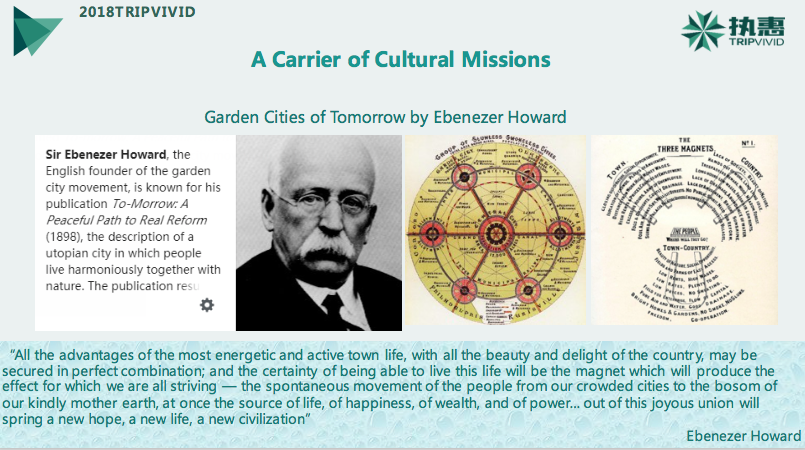
我想这是欧洲乡村旅游对中国的吸引力,发展模式到文化互动,也是中欧旅游交流更好的角度,不仅仅是中欧两大旅游目的地互送游客那么简单,我们需要更开放、更创新、更深度、更广泛的交流,不管官方还是产业,都是如此。我衷心的希望中国的乡村有朝一日也像欧洲的乡村那么美,产业那么发达,能在更高层面上互享两大文明体的优秀成果和体验彼此的美好生活方式。谢谢大家!
I think this is the attraction of European rural tourism to China, from the development model to cultural interaction, but also a better perspective for Sino-European tourism exchanges. It is not only as simple as sending tourists to each other between the two major tourist destinations in China and Europe. We need more open, innovative, deeper and wider exchanges, both official and industrial. I sincerely hope that the countryside of China will one day be as beautiful and industrialized as the countryside of Europe, so that we can share in a higher level the outstanding achievements of the two civilizations and experience each other's beautiful way of life. Thank you!




.jpg)





